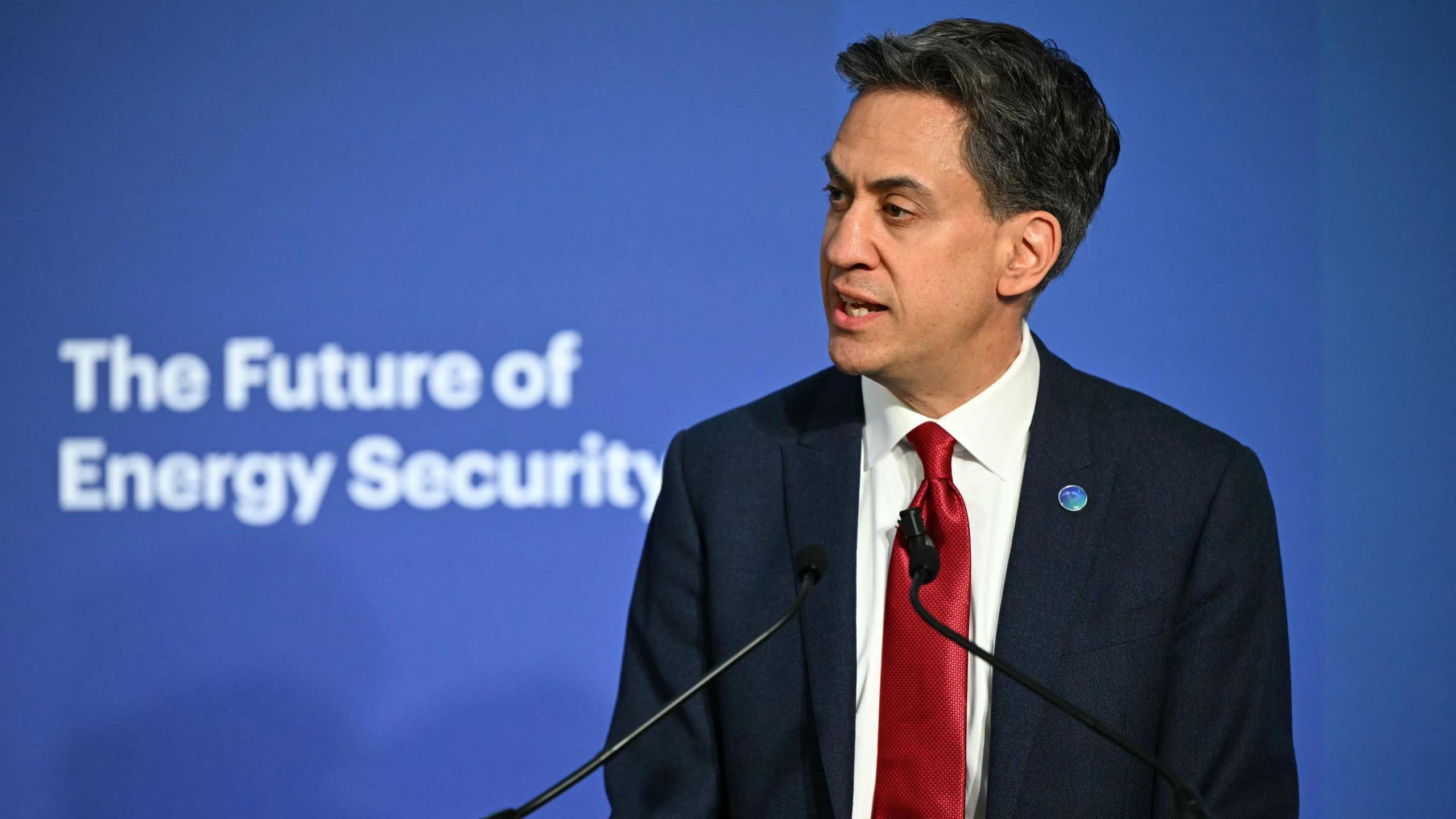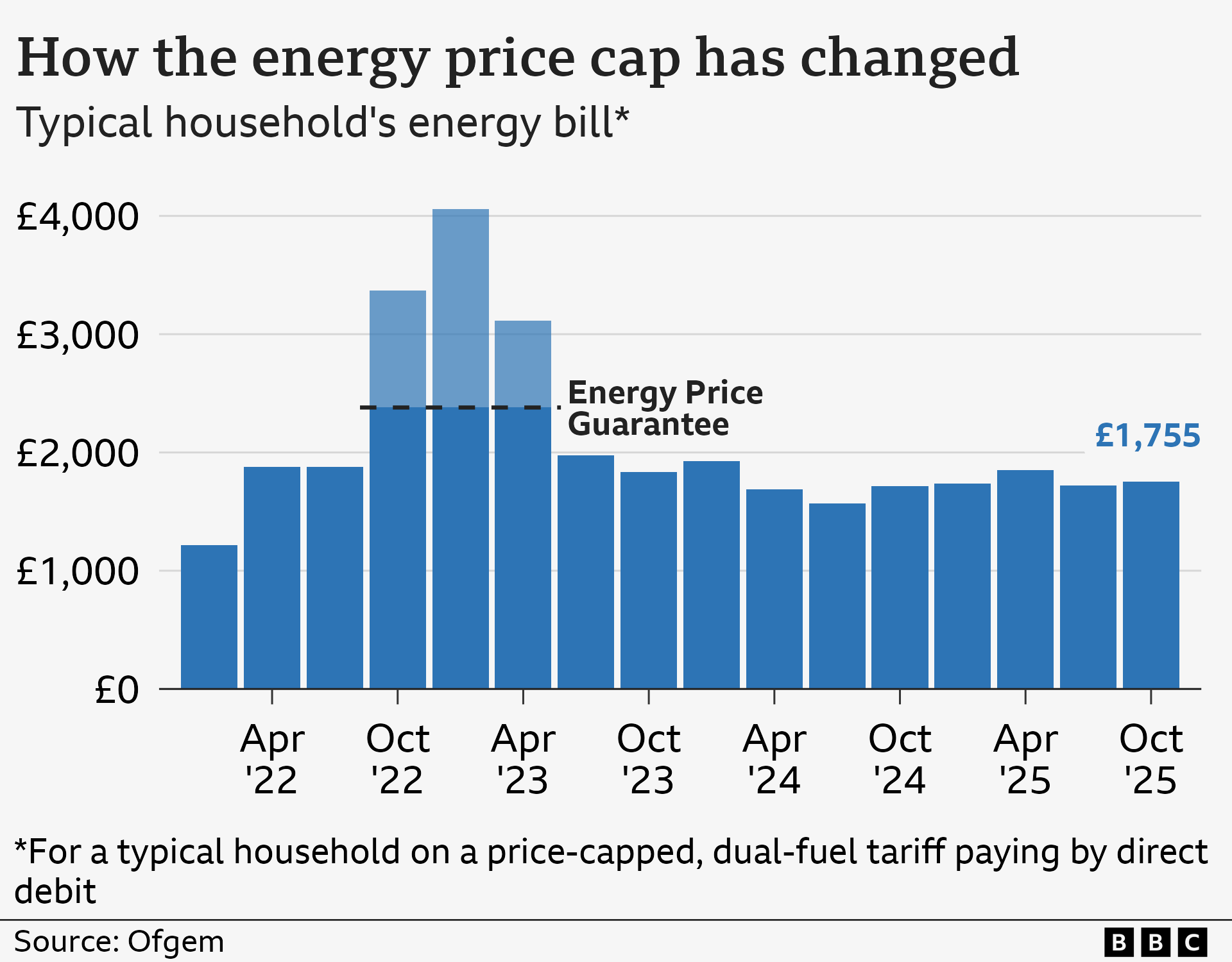Source of Miliband's energy bill pledge casts doubt on savings

- Published
Energy Secretary Ed Miliband's promise to cut energy bills by £300 could be "wiped out" by rising electricity costs, according to the expert behind the savings estimate.
Miliband's pledge - which he has stood by in the face of fierce criticism from opponents who say it is unachievable - is based on a 2023 report, external by energy think tank Ember.
But the author of the report, economist Pawel Czyzak, has told the BBC the analysis needs to be updated to take into account changes to the cost of offshore wind and other factors.
A spokesperson for Miliband's department said the UK government remained "determined to bring down bills, for good, and stand by our commitments".
It comes as former Labour Prime Minister Tony Blair's think tank calls for the UK government to shift it focus from clean power to cheaper electricity.
In a new report, the Tony Blair Institute says if the transition to renewable energy "continues in a way that raises costs, weakens reliability and weakens growth, it will fail both practically and politically".
The report suggests the government's Clean Power 2030 plan should be reframed as Cheaper Power 2030, and argues carbon taxes on gas should be axed to lower energy bills.
The UK government insists its plan for clean power to produce at least 95% of Great Britain's generation by 2030 will lower bills by that date.
The mission was "exactly how we will deliver cheaper power and bring down bills for good", a government spokesperson said.
Miliband's department has insisted it is already delivering many of the policies the Tony Blair Institute has called for, including expanding nuclear power and speeding up grid connections.
Gas and electricity bills went up by 2% for millions of people in England, Wales and Scotland under energy regulator Ofgem's latest price cap this month.
Last week, Energy Secretary Ed Miliband told the BBC the Labour government stood by its promise to lower energy bills by £300 by 2030.
He said energy bills were high in the UK "because of our dependence on fossil fuels" and the spike in the price of gas since Russia invaded Ukraine in 2022.
Energy prices increased drastically in 2022 following the invasion, and although costs have gone down, they have remained high by historical standards.
Energy experts say higher wholesale costs have primarily been driven by the UK's reliance on gas and its exposure to its volatile prices on international markets.
Delivery challenges
Ember's analysis was first included in a Labour press release about the party's energy policies in March 2024 and the Department for Energy Security and Net Zero (DESNZ) has since confirmed the pledge was based on Ember's forecast.
In its 2023 analysis, the think tank said UK households "could save £300 every year on their electricity bills in 2030 if the government completes its switch to a mostly clean power system by then".
Ember said its baseline for measuring these savings was Ofgem's price cap between July and September in 2023.
The analysis said savings from renewables would "far outweigh the total investment costs required".
Czyzak told the BBC Labour's pledge could still be achieved in a number of ways, including removing costs such as green levies from energy bills, or financing grid investments through rises in general taxation.
But when asked if the £300 savings estimate still stood, Czyzak said it was now "a much different situation than it was in 2023".
He said the projected savings in his analysis were dependent on a significant drop in the wholesale cost of electricity in a scenario where renewables become cheaper and the dominant source of power in the UK.
"I think the question now will be whether the high cost of offshore wind doesn't disrupt some of these wholesale energy savings," Czyzak said.
He said if the cost of upgrading the electricity grid increased, and wholesale prices don't go down as much, "then it's going to be hard to generate savings".
He added: "So then, yes, there is a risk of these savings being wiped out if we can't get the actual electricity cost down, and that might happen if offshore wind is too expensive."
Czyzak said Ember never suggested the £300 pledge was "the best solution to everything".
"I think it's generally quite a tricky one because of the volatility around everything. Everything in this market is very volatile. So if you're just looking for a fixed single number, it's not that easy to deliver," he told the BBC.
While DESNZ has accepted market conditions have changed, it argues that new renewables are still cheaper to build than new gas-fired power plants.
A DESNZ spokesperson said lowering bills was "central to every decision we make and why we have already consented a record amount of clean energy".
They added: "By making Britain a clean energy superpower we are getting the UK off the rollercoaster of fossil fuel prices and onto clean, homegrown power that we control."

The cost of household energy bills has become a prominent political battleground, with the Conservatives and Reform UK blaming net-zero policies for higher prices.
Both opposition parties say they would ditch climate targets and focus their efforts on making energy cheaper, but have presented different plans.
Reform UK has pledged to restart fracking for shale oil and impose taxes on the renewable energy sector if it wins power.
The Conservatives say they would repeal the Climate Change Act 2008, ditch carbon taxes on electricity generation and cut a funding scheme for renewables.
Shadow energy secretary Claire Coutinho has accused Tony Blair's think tank of "copy-and-pasting my speeches".
The latest report by the Tony Blair Institute comes after the former prime minister called for a major rethink of net-zero policies earlier this year.
The government has not heeded his call and is pushing back against the think tank's latest report, which backs net zero by 2050.
Blair and his think tank have come under scrutiny over the clients they have worked with and their links to oil and gas.
A DESNZ spokesperson said the think tank's report "rightly recognises that clean power is the right choice for this country".
"Our mission is relentlessly focused on delivering lower bills for the British people, to tackle the affordability crisis that has been driven by our dependence on fossil fuel markets," the spokesperson added.
"That's why we have launched a golden age of new nuclear, consented a record amount of clean power, and welcomed the announcement of over £50bn private investment into the UK – as our mission delivers economic growth and good jobs across our country."
Miliband defends clean power goal after energy bills rise
- Published14 October
Ed Miliband hints at cut to VAT on energy bills
- Published19 October
If the UK has more renewable energy, why aren't bills coming down?
- Published24 April

Sign up for our Politics Essential newsletter to keep up with the inner workings of Westminster and beyond.